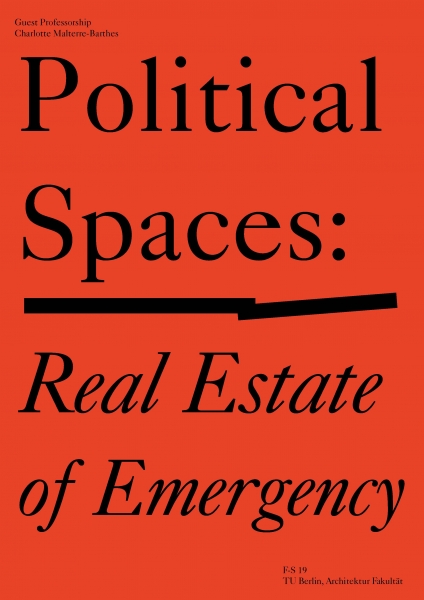Research + Teaching
Political Spaces: Urban Frictions/ Real Estate of Emergency
TU Berlin, Guest Professorship Architecture and Urban Design 2018-2019
“I think that (architecture in itself can) resolve social problems and does produce positive effects when the liberating intentions of the architect coincide with the real practice of people in the exercise of their freedom.” Michel Foucault, Space, Knowledge, and Power.
‘Political space’ is a term borrowed from political science that refers to the available room for citizens to voice and influence political processes and outcomes. This space incorporates the actors, structures, and processes that form politics and patterns of governance of today. The studio “Political Spaces” builds upon this concept, expanding on Michel Foucault’s theories of power. The goal is 1) the exploration of how operational tools and design strategies available to the profession of architecture at the scale of the built environment and of the territory can allow for maneuvering towards freedom, and 2) to carve out room, and design actual spaces for resistance and change—within the discipline, but primarily for the rest of the body politic.
Choreographed by episodes that set the tone of the studio (i.e. templates, graphic standards, references), exploring concrete resistant examples, empowered spatial programs, an intense research phase focused on sites undergoing construction as symptomatic of the land-use competition in Berlin, it emerged clearly that buildings are never simple ‘objects’ but the product of cultural, social, economic, and political mechanisms. The last Episode is the project: Political spaces. Challenging the existing project, actors, economic model, zoning, program, etc. the goal is to propose a tactic/strategy to overthrow and change the situation for the betterment of the neighborhood, the city, the public with a new program, and then to propose a design of actual spaces that serve the common good: a project.
During the year, a blog was conducted, chronicling the studio as well as references.
The work was exhibited in September 2019 as part of the show curated by ARCH + ‘1989–2019: Politics of Space in the New Berlin’, at Neuer Berliner Kunstverein (nbk), a show that outlined the urban and architectural development from the point of view of the supposed “end of history”: How did Berlin become what it is today? The exhibition reflects the perspectives and myths of history, of the market and of creativity.
Students: Mascha Ritter, Lisa Sophie Woebcken, Guilherme Gaspar, Sacha Jonckers, Camille Valette, Francesco Grillo, Natalya Dikhanov, Cecilia Santamaría, Katharina Kocol, Monika Pawlak, Maximilian Kessler, Anatol Rettberg, Felix Schöllhorn, Clara Salaün, Katarzyna Obarzanowska, Laura Dandrada de Almeida, Davide Broggio, Sofia Vila Clavell, Valentina Nadwornicek, Huichao Ding, Jieqiong Gao, Felix Reiter, Anna-Maria Tiedemann, Lya Kröger, Zeynep Sena Oktar, Elisabeth Haentjes, Jakob Adler, Paul Harries, Inka Marie Kuik, Mick Riesenberg (2018-2019)
Daniel Baše, Cansu Bulduk, Daniel Platon,Sarah Liz Dietz, Liv Lees, Sarah Gretsch, Mathilde Pagneux, James Heusser-Kowoll, Sinali Lal d’Aram de Valada, Olivia Daw, Jennifer Jiang, Ioanna Nicolaou, Tayfun Saman, Yara Dessoky, Ludwig Thanhäuser (2019)
2018-2019, Guest Professorship TU Berlin.
Teaching Assistants: Wassily Walter, Cecilia Santamaria, Nicolas König



